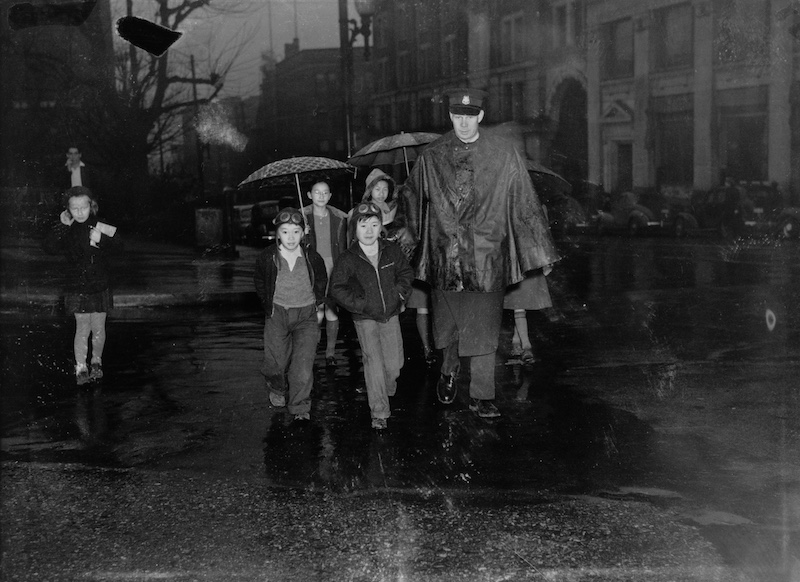A Letter to the Prime Minister

Japanese Canadian children being escorted by Vancouver police. Vancouver Public Library @ Flickr Commons.
In 1944, Toyo Takahashi, a Japanese Canadian woman, wrote the following letter to Prime Minister William Lyon Mackenzie King, protesting the forced sale of her home in Victoria, British Columbia under the wartime legal regime that had emerged to dispossess Japanese Canadians of their property and “liquidate” their belongings:1
Dear Sir:
The Director of the Office of the Custodian in Vancouver has notified us of your policy of liquidation of Japanese property. Because of this policy my property has now been catalogued for sale. This liquidation is against your promises, and my wishes, furthermore it is utterly undeserved.
Please remind yourselves that before our oppression became politically fashionable, abetted by your evacuation policy and your seemingly tacit approval of all the undemocratic propaganda directed against us who are not your enemies, that the Japanese minority had the best reputation for morals and for vivid spirit of any minority in British Columbia. According to the Canadian Institute of Public Opinion, this reputation is still intact in spite of all the loud abuse levelled against it.
The contribution which my husband and I have made to this reputation is more than ordinary. My property at 42 Gorge Road, Victoria B.C. is tangible evidence of this contribution. My husband has invested heavily in our home and garden. During a period of ten years we have succeeded in collecting many valueable [sic] and rare plants, shrubs and trees. … They are probably the only non-commercial gardenia trees in Victoria. On one occasion the Parks Superintendent of Victoria approached my husband and obtained for grafting some buds of a rare variety of cherry blossom. …
Our unique collection was well known and was widely appreciated by fellow hobbyists. Testimony of this appreciation is shown in the way people would stop to compliment us as they strolled by, many requested permission to walk through our garden, motorists local and tourist would slow down or even stop, and driver of sightseeing busses used to point out our home and garden as they drove by. When the evacuation became a stark reality my husband received many offers from nurseries to buy our collection but he declined.
Didn’t you promise to keep intact all properties until we returned? Isn’t the garden an asset to Victoria just as much as it is a pride and joy to us? As for proof, during a survey conducted by the Victoria Horticultural Society, Mr Takahashi was granted an award of Merit, dated August 16, 1935. Two years later during the Royal Visit, their Majesties the King and Queen drove past our home. We treasure the memory of seeing Her Majesty turn her head to see our garden.
Not only did our home and garden help to establish Victoria as “The Garden City of Canada” it also helped to cheer the sick and crippled. … By selling chrysanthemums which we had grown we raised money for the St. Joseph’s Hospital. In 1938, 1939, 1940, and 1941, we did the same … [for] the Junior Auxiliary of the Queen Alexandra Solarium for Crippled Children.
As citizens of Victoria we have participated in such civic affairs as May 24 celebrations and Christmas home lighting contests. These affairs were part of Victoria’s constantly extensive and intensive campaign to attract tourists. …
An undeserved liquidation of my property … will not only jeopardise our present status but far worse our future welfare as well. This property is our home, the reward for long years of toil and anticipation, a source of recreation, a stake in the future of Victoria, and an insurance for our later welfare. …
After all our efforts in good citizenship we do not deserve to have our retirement jeopardised by the liquidation of our properties.
Yours very truly,
Toyo Takahashi
(1) How might the federal government’s “promises”, described by Toyo Takahashi, be interpreted as giving rise to a legal trust, in which the Director of the Office of the Custodian acts as the trustee of Takahashi’s property? What would be the implications of such an interpretation? Why was it rejected by the Canadian courts?
(2) What does Toyo Takahashi’s letter suggest about the link between the “problem of recognition” in property law, ownership, and the idea of Canadian citizenship?
-
Quoted in Katlin Findlay, Trevor Wideman and Yasmin Amaratunga, “‘After All Our Efforts at Good Citizenship’: Propriety, Property, and Belonging in the Dispossession of Japanese Canadians, 1940s” (2023) 104:1 The Canadian Historical Review 76 at 84-85. ↩︎